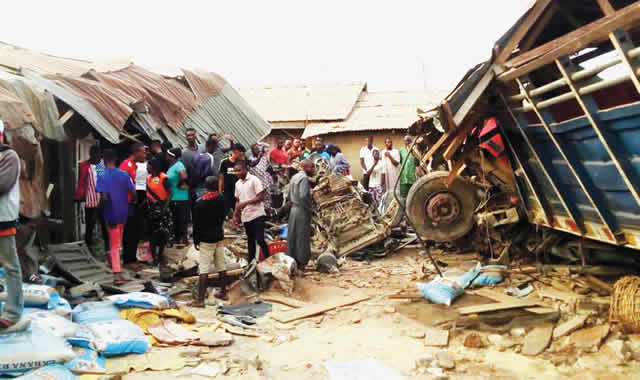
The recent death of traders displaying their wears by the roadside market has once again brought to the fore the urgent need to address the phenomenon once and for all.
The latest of such tragedies occurred on Saturday 12 January on the popular dual carriage Ado-Iworoko-Ifaki Highway in Iworoko-Ekiti in Irepodun/Ifelodun Local
Government Area when a truck rammed into a crowd of roadside traders, killing about fifteen people including a yet to be identify NYSC member and injured several others.
The fatal accident had involved an articulated vehicle carrying thousands of branded bags of campaign rice belonging to a politician and sitting senator vying for another term in the forthcoming February 2019 election in Ondo State.
Investigation revealed that the monarch of the ancient community also bid the world goodbye five days after losing 15 residents in an auto-crash which occurred in the town last Saturday.
No fewer than four houses and adjoining lock-up shops were also
destroyed as the vehicle swerved off the road and crashed into a busy night market, throwing the entire Iworoko community into mourning.
The driver of the ill-fated vehicle was said to have lost control following brake failure which resulted in the tragedy and was almost lynched by residents of the community but ran for escape while effort is still on to get him arrested.
Some of the high profile personalities, youths and other age groups in the town described the ugly incident as a double tragedy and very unfortunate to the entire state.
According to the available records, a tipper driver also lost control of the truck and overran eight people at the Oke Market located by the roadside in Ikpoba-Okha Local Government Area of Edo State. Among those killed were the driver of the bus, the conductor as well as woman and children. Angry youths reacted by razing down the truck.
Shortly three weeks later, no fewer than four people reportedly lost their lives, while 10 others sustained various degree of injuries when a tipper loaded with sand crashed into the Moniya Butcher Market situated along Iseyin road in Ibadan, the Oyo State capital. The driver of the tripper was said to have escaped from the scene of the incident unhurt.
The incidents became rampant in 2010. In March of that year, over 100 casualties were recorded at the Felele Market situated along Lokoja Highway when a truck ploughed into the roadside traders and school children. Within the same period, a trailer mowed 90 people at a roadside market in Dekina, Kogi State. Another trailer crushed four roadside traders at Uselu Market along Ugbowo-Lagos road in Benin City.
Also, a petrol tanker on high speed went out of control, somersaulted and burst into flames at the popular Madalla Market along Zuba-Kaduna road. The driver was among those killed, while several others were injured in the ensuing conflagration. The disaster would have been more serious if it had happened on a Thursday, the normal market day at Madalla.
There is no doubt that road accidents in this country are caused by human error: negligence on the part of motorists, reckless driving, drunk-driving, driving under the influence of illicit drugs, putting faulty vehicles on the highways and embezzlement of public funds meant for highway maintenance, among others. These are some of the reasons that make it very risky to have markets near roads which such road users ply.
As the situation moved from bad to worse, the rampancy of the roadside market killings became so worrisome that the Federal Road Safety Commission (FRSC) under the former Corp marshal, Osita Chidoka, took up the guntlet along with other stakeholders to join the call for the relocation of markets situated along the highways to avoid unnecessary deaths from reckless driving.
The FRSC has the mandate to ensure the safety of lives and properties along our highways. So, it ought to have gone beyond a mere appeal way back then. Had the commission moved to make roadside trading illegal, the recent tragedies in Iworoko-Ekiti would have been averted. In the immediate, the commission should make the presence of its marshals felt at such markets.
The culture of roadside trading has always been informed by the travellers’ propensity to park their vehicles and shop. But, as it can be seen, that culture of convenient shopping has been endangered.
Majority of commercial drivers are ill-trained, illiterate and chronic drug users who’s sense of judgement is warped and could easily turn roadside markets into killing fields.
Nigeria has found itself in a sorry situation where heavy-duty vehicles are doing the work of trains across the country, thanks to the collapse of rail transportation.
While working towards making roadside market trading illegal, we urged various market operators at the local government level to ensure that adequate provision is made to accommodate traders who cannot afford to pay for shops and stalls to market their goods.
On the final note, it is essential that both the Local, State and Federal Governments through other relevant agencies, such as Traffic Wardees, Ekiti Traffic Management Agency (EKSTMA), Police should collaborate together and enact law forbidden roadside trading. Also Churches, Mosques and other social gathering should not be left out in this crusade. It would amount to a tragic irony for these traders to get killed while toiling to survive. God bless Nigeria!
